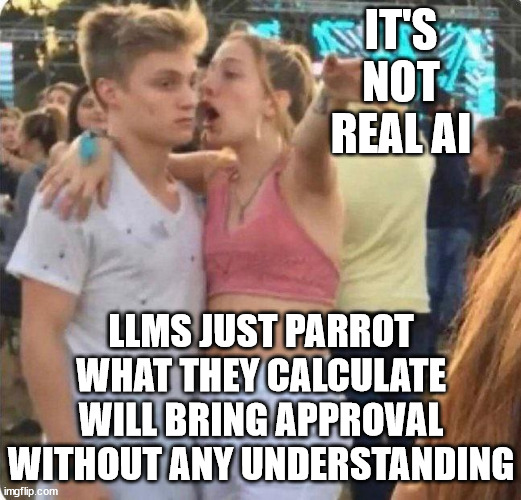this post was submitted on 05 Feb 2024
667 points (87.9% liked)
Memes
45660 readers
1142 users here now
Rules:
- Be civil and nice.
- Try not to excessively repost, as a rule of thumb, wait at least 2 months to do it if you have to.
founded 5 years ago
MODERATORS
you are viewing a single comment's thread
view the rest of the comments
view the rest of the comments

They're kind of right. LLMs are not general intelligence and there's not much evidence to suggest that LLMs will lead to general intelligence. A lot of the hype around AI is manufactured by VCs and companies that stand to make a lot of money off of the AI branding/hype.
Depends on what you mean by general intelligence. I've seen a lot of people confuse Artificial General Intelligence and AI more broadly. Even something as simple as the K-nearest neighbor algorithm is artificial intelligence, as this is a much broader topic than AGI.
Wikipedia gives two definitions of AGI:
If some task can be represented through text, an LLM can, in theory, be trained to perform it either through fine-tuning or few-shot learning. The question then is how general do LLMs have to be for one to consider them to be AGIs, and there's no hard metric for that question.
I can't pass the bar exam like GPT-4 did, and it also has a lot more general knowledge than me. Sure, it gets stuff wrong, but so do humans. We can interact with physical objects in ways that GPT-4 can't, but it is catching up. Plus Stephen Hawking couldn't move the same way that most people can either and we certainly wouldn't say that he didn't have general intelligence.
I'm rambling but I think you get the point. There's no clear threshold or way to calculate how "general" an AI has to be before we consider it an AGI, which is why some people argue that the best LLMs are already examples of general intelligence.
Well, I mean the ability to solve problems we don't already have the solution to. Can it cure cancer? Can it solve the p vs np problem?
And by the way, wikipedia tags that second definition as dubious as that is the definition put fourth by OpenAI, who again, has a financial incentive to make us believe LLMs will lead to AGI.
Not only has it not been proven whether LLMs will lead to AGI, it hasn't even been proven that AGIs are possible.
No it can't. If the task requires the LLM to solve a problem that hasn't been solved before, it will fail.
Exams often are bad measures of intelligence. They typically measure your ability to consume, retain, and recall facts. LLMs are very good at that.
Ask an LLM to solve a problem without a known solution and it will fail.
The ability to interact with physical objects is very clearly not a good test for general intelligence and I never claimed otherwise.
Can your calculator only serve problems you already solved? I really don't buy that take
Llms are in fact not at all good at retaining facts, it's one of the most worked on problems for them
Llms can solve novel problems. It's actually much more complex than just a lookup robot, which we already have for such tasks
You just take wild guesstimates on how they work and it just feels wrong to me to not point that out